八上 英语 教学讲义Unit_2
Unit2知识点讲解课件人教版八年级英语上册

Section B The Third Period 1a-2b
1….but we were surprised that ninety percent of them use the Internet every day. “be surprised + that从句”意为“……很惊讶/吃 惊”。be surprised at sth.意为“对某事感到惊 讶”; be surprised to do sth.意为“对做某事感到 惊讶”。
She is good at dancing. =She does well in dancing.她擅长跳舞。 (2)be good for对……有益(有用),后接表示人或事物的 名词。Reading is good for you.读书对你有好处。
(3)be good to对……好(和善、慈爱),后一般接表示人或 人格化的名词,good相当于friendly。
Section B The Second Period grammar focus-3c
He plays at least twice a week. least副词“最小;最少”,形容词“最小的;最少 的”,least 是 little的最高级。短语at least表示“至 少”。
He has the least money of the three. 这三个人中,他的钱最少。 I study at least for 6 hours every day. 我每天至少学习6个小时。
He could hardly see anything.他几乎什么也看不到。 It hardly ever rains here.这儿很少下雨。
(2)hardly用于反意疑问句时,后半句用肯定提问。
外研版英语八年级上 说课稿 讲课稿 Module2 Unit2

(P13)我们再来了解一下剑桥大学。Cambridge University is in ________(点Cambridge). TheUniversity of Cambridge was founded in 1209. It is one of the oldest universities in the world and one of the largest in the UK.剑桥大学位于剑桥。这所大学成立于1209年。它是世界上历史最悠久的大学之一,也是英国最大的学府之一。9分13秒结束
(P16)I come from Cambridge, a beautiful city in the east of England. 我来自剑桥,一座位于英格兰东部的美丽城市。in the east/west/south/north of...在......的东、西、南、北部(内部)e.g. Beijing is in the north of China.北京位于中国的北部。
二、新课导入(Step 2: leading-in)
(P4)下面我们就开始新课的学习。
人教新目标八年级英语上册第二单元讲义(Unit 2 What's the matter)
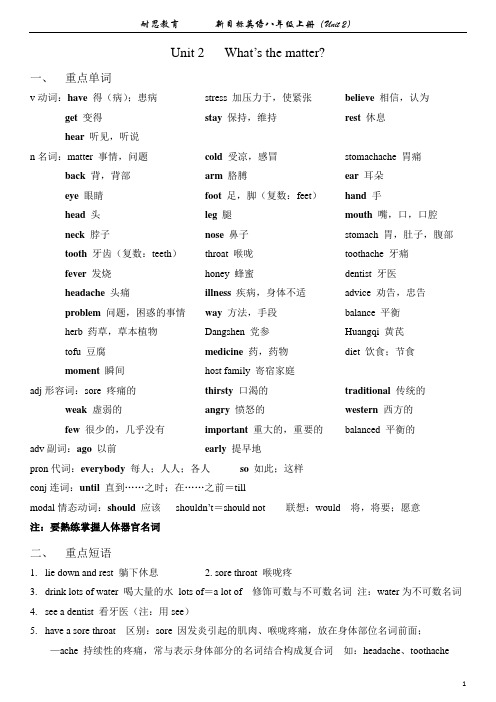
Unit 2 What’s the matter?一、重点单词v动词:have得(病);患病stress 加压力于,使紧张believe相信,认为get变得stay保持,维持rest休息hear听见,听说n名词:matter 事情,问题cold受凉,感冒stomachache 胃痛back背,背部arm胳膊ear耳朵eye眼睛foot足,脚(复数:feet)hand手head头leg腿mouth嘴,口,口腔neck脖子nose鼻子stomach 胃,肚子,腹部tooth牙齿(复数:teeth)throat 喉咙toothache 牙痛fever发烧honey 蜂蜜dentist 牙医headache头痛illness疾病,身体不适advice 劝告,忠告problem问题,困惑的事情way方法,手段balance 平衡herb 药草,草本植物Dangshen 党参Huangqi 黄芪tofu 豆腐medicine药,药物diet 饮食;节食moment瞬间host family 寄宿家庭adj形容词:sore 疼痛的thirsty口渴的traditional传统的weak虚弱的angry愤怒的western西方的few很少的,几乎没有important重大的,重要的balanced 平衡的adv副词:ago以前early提早地pron代词:everybody每人;人人;各人so 如此;这样conj连词:until直到……之时;在……之前=tillmodal情态动词:should 应该shouldn’t=should not 联想:would 将,将要;愿意注:要熟练掌握人体器官名词二、重点短语1.lie down and rest 躺下休息2. sore throat 喉咙疼3.drink lots of water 喝大量的水lots of=a lot of 修饰可数与不可数名词注:water为不可数名词4.see a dentist 看牙医(注:用see)5.have a sore throat 区别:sore 因发炎引起的肌肉、喉咙疼痛,放在身体部位名词前面;—ache 持续性的疼痛,常与表示身体部分的名词结合构成复合词如:headache、toothachehave a cold 感冒have a headache/stomachache/toothache 头痛/胃痛/牙痛have a+名词表示患病的意思6.hot tea with honey 加蜂蜜的热茶7.eat something 吃一些东西否定句中用anything 例:You shouldn’t eat anything.8.feel well 感到舒服9. a good idea 一个好主意10.about a week ago 大约一个星期前11. I think so 我想是这样12.be stressed out 紧张的13. go to bed early 早点上床睡觉14.drink some water 喝一些水15. listen to music 听音乐16.traditional Chinese doctors 传统的中医17. for example 例如18.a balance of yin and yang 阴阳平衡19. eat hot yang foods 吃一些壮阳的食物20.Chinese medicine 中药21. be popular 受欢迎22.be weak/tired 虚弱/疲劳23. in many western countries 在许多的西方国家24.be easy to 很容易做某事25. have a healthy lifestyle 有一个健康的生活方式26.get tired 变得疲劳27. a few nights 几个晚上 a few+名词复数形式28.other healthy food 其他健康食品29. ask sb for advice 向某人征询建议30.give the best advice 给出最好的建议31. be important to…对……很重要32.sleep eight hours a night 一夜睡八个小时33. need to do sth 需要做某事34.get stressed out 变得紧张35. eat a balanced diet 均衡饮食36.stay/keep healthy 保持健康37. give you medicine 给你开药38.at the moment 现在39. have a lot of headaches 头很痛40.study late 学习很晚41. host family 寄宿家庭42.need some conversation practice 需要一些会话练习practice 不可数名词43.really nice 非常好44. too much 太多三、重点句型1.——What’s the matter with Gina?吉娜怎么了?——She’s tired. 她累了①tired 疲倦的它可以与be、feel、get、look搭配使用be tired 身体所处的状态feel tired 强调身体的感觉get tired 侧重身体的变化look tired 侧重视觉效果②What’s the matter? 询问别人的病情同义句:What’s wrong with you? What’s your trouble?③It doesn’t matter 一般用于回答对方的道歉,意思为没关系!2.I have a sore throat 我喉咙疼have 患(病)的意思have a+名词表示患有某种病症3.That’s a good idea. 那是个好主意4.Traditional Chinese doctors believe we need a balance of yin and yang to be healthy.传统中医认为阴阳平衡,这样才能健康。
八上U2T2讲义
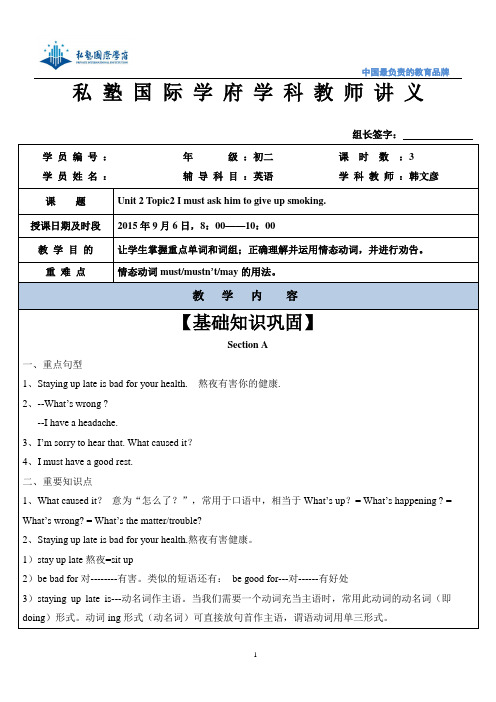
(2)enough作代词,意为“足够的东西”,
如:I have enough to do .我要做的事够多了。
【口诀】enough一词的位置,出“名”在前,幸福“(形”“副”)在后。
如:He has a serious disease in the lung.他有严重的肺病。
She ’t come because of illness.她因病不能来。
3、force sb. to do sth.强迫某人做某事。
4、once①adv曾经、一次。②conj,一旦,一......就......(相当于as soon as)
译成“可能”的还有must/might。
must是比较有根据的推测,把握性最强。
如:That must be his bike.His is black.
might表示推测的把握性比may更弱。
如:You might get a headache when you work too hard.
否定句中表示推测只能用can't。
如:The man in the room can't be him.He has gone to Beijing.
Exercise:
一、单项选择。
( ) 1.our English teacher is always very_________ and makes us feel________.
( )3.—Does the child need any help?
—No.She is________ to dress herself.
Unit 2(单元解读课件)-八年级英语上册(人教版)
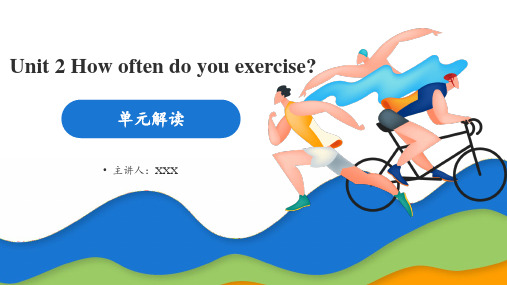
do you go
格形式梳理语法要点;活动
to the
3a-3c引导学生进一步体会运
movies?
用并巩固目标语言结构。通
3. Do you go
过口头笔头训练帮助学生解
shopping?
决实际问题。
第三课时Section B 1a-1e 课时内容解读
单元主题:人与自我(生活与学习)
教材板 语 块篇 形 式
5
单元目标概览
语言能力
能够在“记者采访”“生活习惯大调查”等真实情 境中综合运用有关课示活动和饮食等生活习惯的表
1
达、频度副词和短语以及how often引导的特殊疑问 句,询问和描述从事周末活动、课余活动的频率;提 升听说能力、阅读技能,并培养自己良好写作习惯;
思维品质
通过听说读看写等训练,能够准确获取有关课余 活动、生活习惯和某人从事某一活动的频率的信
B 3a- 务 写作板块包括三个活动,内容层层 问 卷 所 需 元 素 ,
self
递进,3a要求学生会根据表格补全 并 合 理 设 计 关 联 句型:
check
范文,3b让学生运用表格整理信息,单 元 主 题 的 调 查 She has a lot of good
3c要求学生仿照范文结合实际进行 问 卷: 基于调查数 habits.
句型: —How often do you…?
活动的动词
课时1c-1b中呈现了有关
—How many hours do you…? 词组,运用
食物和睡眠的词汇,引 导学生运用本单元目标
how often对
语言开展对话;1d-1e利
所学活动进
用做报告形式将知识联 系生活实际,巩固听力
八年级英语上册Unit2Howoftendoyouexercise讲义+习题人教新目标版(2021

八年级英语上册Unit 2 How often do you exercise讲义+习题(新版)人教新目标版编辑整理:尊敬的读者朋友们:这里是精品文档编辑中心,本文档内容是由我和我的同事精心编辑整理后发布的,发布之前我们对文中内容进行仔细校对,但是难免会有疏漏的地方,但是任然希望(八年级英语上册Unit 2 How often do you exercise讲义+习题(新版)人教新目标版)的内容能够给您的工作和学习带来便利。
同时也真诚的希望收到您的建议和反馈,这将是我们进步的源泉,前进的动力。
本文可编辑可修改,如果觉得对您有帮助请收藏以便随时查阅,最后祝您生活愉快业绩进步,以下为八年级英语上册Unit 2 How often do you exercise讲义+习题(新版)人教新目标版的全部内容。
Unit2。
How often do you exerciseShe exercises the dog every day。
每天她都遛狗。
【拓展】exercise作名词时,意为“锻炼;运动"时是不可数名词,意为“体操;练习”时是可数名词.例如:I should eat less food and take more exercise. 我应该少吃饭,多锻炼。
We do morning exercise every morning.我们每天早上都晨练。
1。
junk food 垃圾食品 (不可数)2。
drink milk 喝牛奶3. three or /to four times a week 一周三到四次4。
eat fruit 吃水果5. want 用法A.want( sb。
) to do sth. 想要某人做某事6. be good/bad for 对……有好处/坏处7。
go camping in the country 去乡下露营8. play sports 做运动=do sports9. one to three times a week 一周一至三次10。
人教版八年级英语上册Unit2知识点精讲

Unit 2 How often do you exercise?一、词汇应用1.on weekends 在周末2.help with housework 帮忙做家务3.hardly ever 几乎从不4.go shopping 去购物5.once a week / month 一周 / 月一次6.twice / three times a week一周两 / 三次e the Internet 使用互联网8.read English books 阅读英文书籍9.go to the movies 去看电影10.favorite program 最喜欢的节目11.swing dance 摇摆舞12.have piano lessons 上钢琴课13.drink milk 喝牛奶14.stay up late 熬夜15.go online 上网16.play sports 做运动17.eat a healthy breakfast 吃健康的早餐18.at least 至少;不少于;起码19.go to bed early 早早上床睡觉20.junk food 垃圾食品21.be good for one's health对某人的健康有好处22.have good / bad habits 有好 / 坏习惯23.play computer games 玩电脑游戏24.the answer to the question 问题的答案25.... percent of the students百分之……的学生26.such as 例如;像……这样27.draw pictures 画画28.watch TV for over 2 hours看两个多小时的电视29.go to the dentist 看牙医30.teeth cleaning 洗牙31.more than 多于32.less than 少于33.want sb. to do sth. 想让某人做某事34.ask sb. about sth.询问某人关于某事的情况35.How come? 怎么会呢?36.Old habits die hard. 旧习难改。
八上unit2讲义
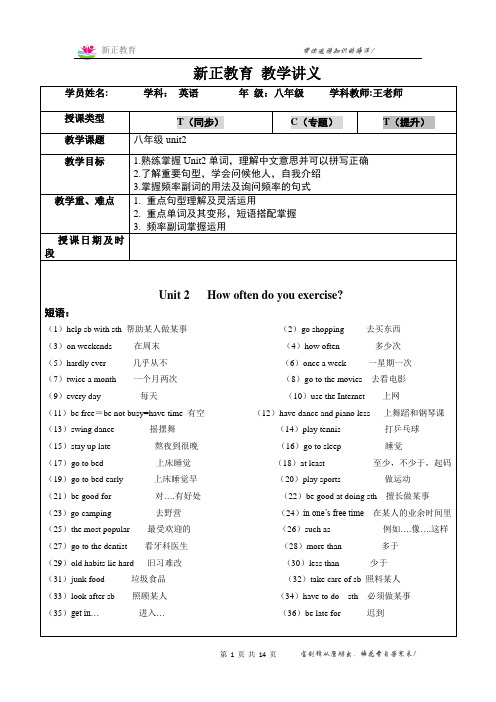
新正教育教学讲义15.point v.指;指向point to 指向;表明point at 指向16.free空闲的,有空的,反义词为busy.be free 有空,闲着,相当于have time.I‟ll be free next week. = I‟ll have time next week.17.How come?怎么会?怎么回事?表示某件事情很奇怪,有点想不通;可单独使用,也可引导一个问句,相当于疑问句why, 但how come 开头的特殊疑问句使用的仍然是陈述语序。
How come Tom didn‟t come to the party? = Why didn‟t Tom come to the party?18.stay up late指“熬夜到很晚,迟睡”。
Don‟t stay up late next time.stay up指“熬夜,不睡觉”。
He stayed up all night to write his story.19.go to bed强调“上床睡觉”的动作及过程,但人不一定睡着。
I went to bed at eleven last night.go to sleep强调“入睡,睡着,进入梦乡”。
She was so tired that she went to sleep soon.20.percent 百分数,基数词+ percent:percent 没有复数形式,作主语时,根据所修饰的名词来判断谓语的单复数。
Forty percent of the students in our class are girls. Thirty percent of time passed.21.more than 超过,多于,不仅仅,相当于over. 在句型转换中考查两者的同义替换。
反义词组为:less than. I lived in Shanghai for more than / over ten years.22. afraid形容词,担心的,害怕的,在句中作表语,不用在名词前作定语。
牛津译林版八上Unit2课时讲义(二)学生版
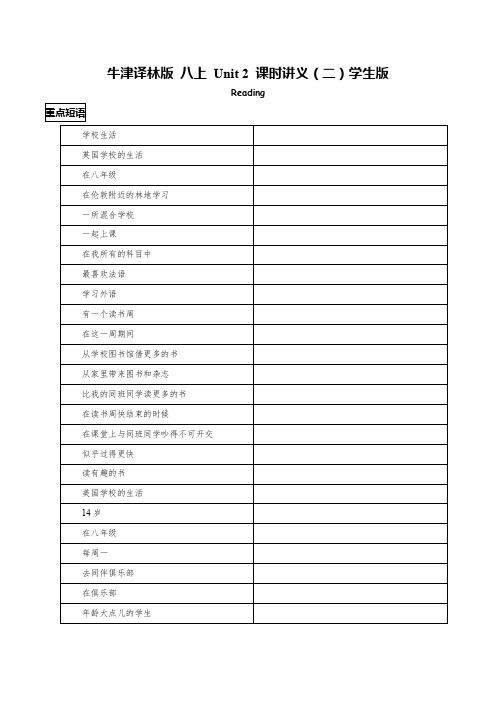
牛津译林版八上Unit 2 课时讲义(二)学生版Reading1.I am in Year 8 at Woodland School near London. 我在伦敦附近的林地学习读八年级。
I’m in the 8th grade at... 我在……八年级______________:“在八年级”= ________________。
表示年级:______________________ = _____________________________。
2.It is a mixed school. 这是一所混合式学校。
mixed:adj.“男女混合的;混合的”。
_______:v.“(使)混合,掺和”。
______________ = ______________ “将A和B混合在一起”。
___________ “混合在一起”。
3.Among all my subjects, I like French best. 在所有的科目中,我最喜欢法语。
like...best:“最喜欢……”= ___________。
French:n.“法语”;adj.“法国的,法国人的,法语的”。
_________:n.“法国”。
__________:n.“法国人”。
复数:____________。
4.Learning foreign languages is fun. 学习外语很有趣。
foreign:adj.“外国的”。
___________:n.“外国人”。
动名词(短语)作主语:单个动名词(短语)作主语时,谓语动词用________形式。
5.During the week, we can borrow more books from the school library. 在这一周期间,我们可以从学校图书馆借更多的书。
during:prep. “在……期间;在……的过程中”。
borrow:vt.“借入”。
辨析:borrow/lend/keepborrow:“借入”,指从别人或别处借东西,为非延续性动词。
人教版八年级英语上册-Unit2-教案
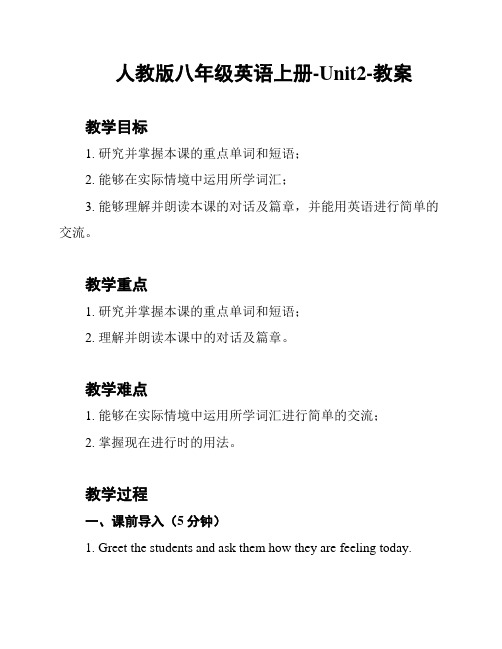
人教版八年级英语上册-Unit2-教案教学目标1. 研究并掌握本课的重点单词和短语;2. 能够在实际情境中运用所学词汇;3. 能够理解并朗读本课的对话及篇章,并能用英语进行简单的交流。
教学重点1. 研究并掌握本课的重点单词和短语;2. 理解并朗读本课中的对话及篇章。
教学难点1. 能够在实际情境中运用所学词汇进行简单的交流;2. 掌握现在进行时的用法。
教学过程一、课前导入(5分钟)1. Greet the students and ask them how they are feeling today.2. Show some pictures on the screen and try to ask them what the pictures are about.二、自主研究(35分钟)1. 学生们自主研究课文,并做好笔记,记录不熟悉的内容和需要了解的疑点。
2. 学生们可以在自主研究的过程中互相讨论并互相帮助。
三、交流展示(15分钟)1. 当做完自主研究后,老师开始组织学生展示他们的研究成果,展示方式并不限定,有朗读、问答等,总之要把研究到的知识用出来,让知识得到巩固。
2. 学生们可以相互交换信息或者反馈,梳理研究内容,发现问题。
四、课堂总结(5分钟)1. 了解本节课的教学内容,培养学生研究语言的兴趣。
2. 学生们要及时复和总结,才能让这些知识真正掌握。
教学板书设计1. 本课的重点单词和短语。
2. Was he doing exercise? Yes, he was.课后作业1. 完成本课课后的题。
2. 总结课上学到的内容。
新目标英语八年级(上)unit2知识要点精讲

新目标英语八年级(上)unit2知识要点精讲【重点短语】1.Clean-Up Day 清洁日2. an old people’s home 养老院3. help out with sth. 帮助解决困难4. used to 过去常常......5. care for 关心;照顾6. the look of joy 快乐的表情7. at the age of 在......岁时8.clean up 打扫(或清除)干净9. cheer up (使)变得更高兴;振奋10. give out 分发;散发11. come up with 想出;提出12. make a plan 制订计划13. make some notices 做些公告牌14. try out 试用;试行15. work for 为…工作;为…. 效力16. put up 建造;举起;张贴17. hand out 分发;散发;发给18. call up 打电话;召集19. put off 推迟;延迟20. for example 比如;例如21. raise money 筹钱;募捐22. take after 与......相像;像23. give away 赠送;捐赠24. fix up 修理;修补;解决25. be similar to 与……相似26. set up 建立;设立27. disabled people 残疾人28. make a difference 影响;有作用29. be able to 能够30. after-school reading program 课外阅读项目【重点句型】1. The boy could give out food at the food bank. 这个男孩可以在食品救济站分发食物。
2. Clean-Up Day is only two weeks from now. 清洁日离现在仅仅两周的时间。
Unit2讲义 八年级英语上册

Unit2讲义鲁教版八年级英语上册1、掌握动名词的部分用法2、学会人际交流的日常对话用语3、spend time alone独处4、hang out with friends和朋友闲逛5、have enough free time有足够的空闲时间6、any+more→anymore adv.再也,不再7、what+ever→whatever pron.任何,每一8、second+ly secondly adv. 第二,其次9、allow v 允许【搭配】 allow doing sth 允许做某事allow sb. to do sth 允许某人做某事They don’t allow smoking. 他们不允许抽烟。
My mother allows me to watch TV. 我妈妈允许我看电视。
be allowed to do sth 被允许做某事10、communicate v交流【拓展】 communication n 交流;沟通 communicate with sb. 和某人交流They communicate with each other by QQ. 他们通过QQ互相联系。
11、pressure n.压力【拓展】press v 按;压→pressure压力(1)不可数名词(物理学)压力 air pressure 气压 blood pressure 血压(2)不可数名词还可指精神上、外界施加的压力 = stress under pressure 在压力下12、development n. 发展;发育;成长Education is central to a country's economic develop ment...教育对一个国家的经济发展至关重要。
What are your plans for the development of your co mpany?你打算怎样来发展壮大自己的公司?13、compete v.竞争【拓展】compete v竞争;对抗→ competition n 竞争【搭配】compete with sb. 和某人竞争 compete against/ with 与……竞争compete for 为……参加比赛14、compare 比较【拓展】compare A with B 将A和B 比较(1)compare…with…把……与…..做比较(2) compare…to…把…..比做……15、return v. 归还,回来【搭配】return (1)v 归还=give backreturn ... to ... = give back to ... 把......还给......(2)v 回来;返回 = come back16、continue 继续;持续【拓展】continue doing sth =go on doing sth 继续做某事(前后做同一件事)continue to do sth = go on to do sth 继续做某事(前后不是同一件事)练习:Let’s continue____________(read) the text. The two teams continued _____(play) the game after half an hourA.playB. to playC. playingD. Played17、perhaps 也许;可能【辨析】perhaps,probably,possibly,maybe辨析⑴perhaps意为“也许,可能”,一般指比较小的可能性。
八年级上册Unit2讲义

Unit2 How often do you exercise?单词housework ['ha?sw??k] n.家务劳动hardly ['hɑ ?dli] adv几.乎不;几乎不;刚才ever ['ev?(r)] adv.以前;在任何时候once [w?ns] adv.一次;以前twice [twa?s] adv.两倍;两次Internet ['?nt?net] n.因特网program ['pr??ɡ r?m] n节.目;程序;课程;节目单full [f ?l] adj. 满的;充满的;完整的swing [sw??] n摇.摆;秋千 v.摇晃;旋转maybe ['me?bi] adv.或许;或许;可能swing dance摇晃舞least [li?st] adj.最小的;最少的coffee ['k?fi] n. 咖啡;咖啡色health [helθ健]康n.;人的身体或精神状态result [r?'z?lt] . 结果;结果percent [p?'sent] adj.百分之 ...的online [??n'la?n] adj.在线的 adv.在线地television ['tel?v??n] n.电视机;电视节目although [??l'e??] conj.固然;只管;但是;但是through [θ ru?] prep穿过.;依靠;向来到body ['b?di] n. 身体mind [ma?nd] .脑筋;想法;建议;心思such [s?t?] adj.这样的;这样的together [t?'ɡ ee?(r)] adv.共同;一同die [da?] v.死;枯竭;消逝writer ['ra?t?(r)] n. 作者;作家dentist ['dent?st] n.牙科医生magazine ['m?ɡ ?zi?n] 杂n.志however [ha?'ev?(r)] adv.但是;不论怎样;不论多么 than [e?n] conj.比almost ['??lm??st] adv.几乎;差不多none [n?n] pron.没有人;没有任何东西,毫无less [les] adj.更少的;较少的point [p??nt] n.见解;重点;重点;小数点;目标;分数短语such as比如;诸如junk food n.垃圾食品;无营养食品at least起码at most 最多hardly ever 极少;几乎从不;难得junk food n.垃圾;废旧杂物 more than超出;多于;不只是;特别less than不到;少于stay up (late)熬夜Leave``` for``走开某地去另一地方···1.how often 意为“多久一次”,常用于对时间频次的发问。
英语秋季同步讲义-八年级上unit2 同步讲义

温月同学教案 学员姓名:温月 上课日期:xxxx.10.13上课时间:8:00-10:00教师姓名: 杨莉莉内容基本要求 Unit TwoNumbers 1. 要求掌握重点单词和词组; 2. 语法点:数词New words and expressions★numbern. 数字v. 给…编号把这些书页从一至十编上号码。
★instruction n.指示,命令,说明先阅读盒上的说明,再动手做蛋糕。
★check v.检查,核实当你完成你的数学作业时,你应该认真检查你的答案。
本讲内容同步串讲Unit 2【强化练习】1. Before taking off, the pilot both engines carefully.2. Read the in the bottle before you take the medicine.3. 2, 7, 9, 19 are .★chess n. 国际象棋(不可数名词)我喜欢下象棋。
★wise adj. 充满智慧的一位有智慧的先生一个明智的选择★challenge v. 向(某人)挑战challenge sb. (to sth.)那位羽毛球运动员向世界冠军挑战。
还可作为名词,“挑战”,为可数名词。
在我们的人生中会有许多挑战。
【搭配】提出挑战接受挑战★promise v. 许诺;承诺他承诺他今晚会来。
n. 诺言make a promisekeep a promisebreak a promise如果你许下诺言,你就应该遵守它。
★prize n. 奖赏,奖品汤姆赢得了一等奖。
price★double v. (使)加倍今年,价格增加了一倍。
【拓展】1.adj. “两倍的,双的”双人间双扇门两个’t’2.n. “双倍”,谁是谁的几倍,不可数名词6是3的两倍。
(the double of)★amount n. 数量大量:a large amount of 注:后接不可数名词Jack花费了大量时间在电脑游戏上。
Unit2 讲义 人教版英语八年级上册
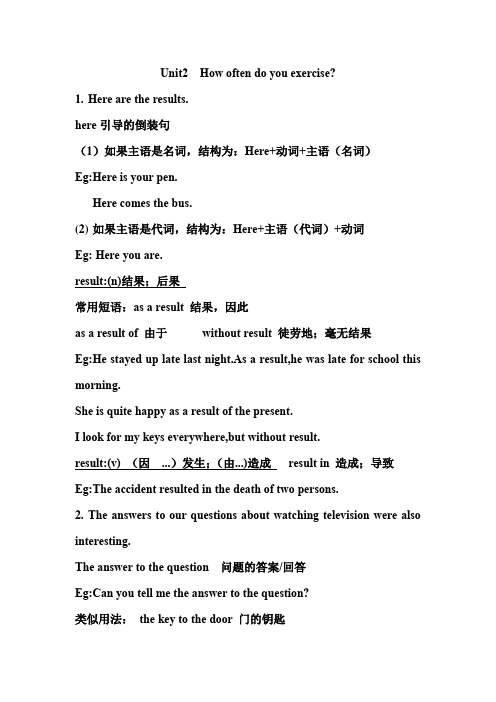
Unit2 How often do you exercise?1.Here are the results.here引导的倒装句(1)如果主语是名词,结构为:Here+动词+主语(名词)Eg:Here is your pen.Here comes the bus.(2)如果主语是代词,结构为:Here+主语(代词)+动词Eg: Here you are.result:(n)结果;后果常用短语:as a result 结果,因此as a result of 由于without result 徒劳地;毫无结果Eg:He stayed up late last night.As a result,he was late for school this morning.She is quite happy as a result of the present.I look for my keys everywhere,but without result.result:(v) (因...)发生;(由...)造成result in 造成;导致Eg:The accident resulted in the death of two persons.2.The answers to our questions about watching television were also interesting.The answer to the question 问题的答案/回答Eg:Can you tell me the answer to the question?类似用法:the key to the door 门的钥匙The ticket to the concert 音乐会的票The solution to the problem 问题的解决方法3.Although many students like to watch sports,game shows are the most popular.although :虽然;尽管;即使(引导让步状语从句=though)although引导的从句可位于主句之前或之后。
人教新目标八年级上英语课件 Unit 2 同步讲解

Unit 2课本要点解析1. 【课本原句】She says it?'s good for my health.【解析】be good for ... 表示“对……有益”;其反义短语为be bad for ...。
这里for是介词,后接名词、代词或V-ing形式。
如:It?'s good for us to do more reading. 多读书对我们有好处。
【拓展】be good后接不同的介词,表达的意思也不同。
如:be good at意为“擅长……”;be good with意为“与……相处得好”;be good to 意为“对……友好”等。
2. 【课本原句】Here are the results.【解析】该句是倒装句, 这种结构的主语应放在谓语动词之后。
该句的主语是the results, 谓语是are。
英语中以here / there开头的倒装句有“Here / There +谓语+主语(名词)”和“Here / There +主语(人称代词)+谓语”两种结构。
如:Here is your pen. 你的钢笔在这里。
(主语是名词短语your pen)Here she comes. 她来了。
(主语是人称代词she)3. 【课本原句】Although many students like to watch sports, game shows are the most popular.【解析】although表示“虽然,尽管”,although与though同义,在一般情况下,可以互换使用。
如:Although / Though my car is very old, I don?'t want to buy a new one. 虽然我的汽车很旧,但我不想买一辆新的。
【提示】在英语中如果用了although 或though, 就不能再用but,但可以用yet 或still;反之,如果用了but , 就不能用although 或though。
- 1、下载文档前请自行甄别文档内容的完整性,平台不提供额外的编辑、内容补充、找答案等附加服务。
- 2、"仅部分预览"的文档,不可在线预览部分如存在完整性等问题,可反馈申请退款(可完整预览的文档不适用该条件!)。
- 3、如文档侵犯您的权益,请联系客服反馈,我们会尽快为您处理(人工客服工作时间:9:00-18:30)。
Unit2 How often do you exercise?一、语法知识频度副词1. 频度副词的含义(1) 表示次数、频率的副词称为频度副词。
always > usually > sometimes > seldom > hadly ever > never100% 80% 60% 30% 10% 0%(2) 表示具体的频率、次数时,一次用once,两次用twice,三次或三次以上用“基数词+times”表示: three times2. 频度副词在句中的位置(1 )频度副词一般在实意动词之前,be 动词、助动词或情态动词之后E.g. We never eat junk food. Lucy is sometimes very busy. I can hardly say a word.(2)有些频度副词也可位于句首,但表示不同含义sometimes 常位于句首,和位于句中区别不大。
E.g. Sometimes Jack plays computer games.often 用于句首时,通常表示强调,且其前一般有quite,very 修饰Usually 也可位于句首,其前不用修饰语。
Always 一般不用于句首,但可以用在祈使句中。
3. 对频度副词提问时,用how often帮助做家务在周末多久一次hardly everonce a week twice a month 每天有空去看电影用互联网swing dance 打网球熬夜;睡得很晚至少have dance and piano lessons早点睡觉进行体育活动对……有好处去野营一点儿也不……在某人的业余时间最受欢迎的go to the dentist 帮助某人做某事How about…?想让某人做某事spend time with sb.向某人询问某事What’s your favorite…? the best way to do sth.三、必背句子1. We found that only fifteen percent of our students exercise every day.我们发现仅仅百分之十五的学生每天锻炼。
2. We all know that many students often go online, we were surprised that ninety percent of them use the Internet every day.我们都知道很多学生经常上网,我们很吃惊他们中有百分之九十的人每天上网。
3. Although many students like to watch sports, game shows are the most popular.虽然很多学生喜欢看体育节目,但游戏节目依然是最受欢迎的。
4. It is good to relax by using the Internet or watching game shows, but we think the best way to relax is through exercise.通过上网或看游戏节目来放松很好,但是我们认为最好的放松方法还是通过锻炼。
5. It’s healthy for the mind and the body.对思想和身体都很健康。
6. So start exercising before it’s too late!开始锻炼,为时不晚。
7. Old habits die hard.旧习难改。
四、知识点1.-----What do you usually do on weekends? -I often go to the movies.(1) on weekends/on the weekend在周末(2) go to the movies 去看电影(3) 第一个do 助动词第二个do 实意动词2. hard作形容词,意为“困难的,艰苦的,硬的”;作副词,意为“努力地,猛烈地”。
hardly意为“几乎不” 表否定意思,和hard没有关系He hardly does any housework at home.(1) The ground is too to dig(2) I can understand them.(3) It's raining ,the people can go outside.3. ----How often do you watch TV? ----Twice a week.(1) how often 意为“多久一次,多长时间一次”,用来提问频率。
(2) twice a week 一周两次5. How come?怎么回事?怎么会?表示某件事情很奇怪,有点想不通。
相当于疑问词why。
但how come 开头的特殊疑问句使用的仍是陈述语序。
How come you didn't tell me about it? = Why you didn't tell me about it?6. 辨析:maybe 与may bemaybe副词,作状语,意为“或许,大概,可能”,常位于句首。
may be 属于“情态动词+be 动词”结构,意为“可能是”。
(1) The baby is crying she is hungry.(2) The woman a teacher .1. exercise v. 锻炼n. 锻炼,练习(不可数名词)do morning exercise 晨练do much exercise 做大量练习2. homework 家庭作业housework 家务schoolwork 学业不可数名词do much housework = do lots of housework 做大量家务活4. once 一次once a week 一周一次once a month 一月一次twice 两次twice a week 一周两次n. 时间,不可数名词time Ex. I have lots of time to do my homework.n. 次数, 可数名词, 表做某事次数三次或以上用timethree times a week 一周三次many times 许多次Ex. I went to the park many times .every day 每天every week 每周5. two or three times a week 一周两三次once or twice a week 一周一两次three or four times a month 一月三四次three to five times a week 一周三到五次到to 或or6. on the Internet 在互联网上surf the Internet 上网冲浪7. program n. 节目favorite … = like… best最喜爱的8.adj. 满的be full of … 充满了= be filled with…full Ex. The bottle is full of water.adj. 饱的--- hungry adj. 饥饿的Ex. I’m full . 我吃饱了.9、at least 至少He exercises at least twice a day.at most 最多11. junk food 垃圾食品fast food 快餐13. health n. 健康healthy adj. 健康的---- unhealthy adj. 不健康的healthily adv. 健康地in good health = healthy 健康的keep/ stay in good health = keep / stay healthy 保持健康a healthy lifestyle 健康的生活方式eat healthily 饮食健康14. the results of … …的结果as a result 结果Ex. As a result , he passed the exam .15. 百分数表达法:基数词+ percent ( 没有复数形式)20% twenty percent百分数做主语时,谓语动词单复数形式看百分数后的名词单复数来定.Fifty percent of the food goes bad.Fifty percent of the vegetables go bad.16. although= though 虽然,不与but连用Ex. Although my grandma is old, she looks very strong and healthy.= My grandma is old , but she looks very strong and healthy.18. mind n. 心智,头脑,思想(不可数名词)v. 介意mind doing sth 介意做某事mind sb’s doing sth 介意某人做某事Never mind . 一点不介意.19. such a / an +形+ 名词单数That’s such a beautiful photo .such +形+ 名词复数/ 不可数名词This is such nice food.so +形This food is so nice .20. die v. 死亡death n. 死亡died adj. 死亡的die --- dying 现在分词lie --- lying22. however 然而whatever 无论什么24. more than 多于---- less than 少于26. sometimes = at times ( 句末) 有时27. how often : 多久一次,对频率副词和频率短语提问.how long : 1) 多久,对for+一段时间提问How long did you stay in shanghai ? I stayed in Shanghai for five days.2) 多长,对物体长度提问How long is your desk ? It’s one meter.how soon : 多久,对in+一段时间提问,用于将来时How soon will you come back? I will come back in three days . how many + 名词复数: 多少,对数量提问how much + 不可数名词:多少,对数量提问how much : 多少钱,对价钱提问how far: 多远,对两地间的距离提问How far is it from your home to school ? It’s 5 miles .how many times : 多少次,对次数提问How many times have you been to Beijing ? I have been to Beijing twice.28. go shopping = do some shopping 去购物29. free adj. 免费的Everything is free here .adj. 有空的= have time ---- busy 繁忙的Are you free this Monday ? = Do you have time this Monday ?in one’s free time 在某人的空闲时间32. What kind of … 什么种类的…?33. be busy doing sth 忙于做某事be busy with sth 忙于某事34. want to do sth 想要做某事want sb to do sth 想要某人做某事35. be good for … 对…有好处We all know that milk is good for our health .be bad for… 对…有害处Smoking is bad for our health .be good at …= do well in … 擅长于… He is good at English . = He does well in English .be good with … 与…相处的好He is good with everyone in our class .36. ask sb about sth 问某人关于某事ask sb for sth 向某人要某物We shouldn’t often ask our parents for money .ask sb for help 向某人求助You should ask the police for help.ask sb to do sth 让某人做某事ask sb not to do sth 让某人不要做某事37. be about sth 关于…Here is the result s about their free time activities.39. find that + 从句He found that no one could answer the question .find + 宾语+ 形/ 名/ doingEx. He found the room dirty . I found him a good boy . I found her standing at the door.find it + 形+ to do sth 发现做某事是…I found it difficult to learn math well.形式宾语真正宾语find it +形+for sb to do sth 发现对于某人来说做某事是…I found it difficult for me to learn English well.40. n ot … at all 一点也不I don’t know it at all.Not at all. 别客气,回答Thank you .41. do sth for fun 做某事取乐We can play computer games for fun .42. the answer to the question 问题的答案the key to the door 门的钥匙the ticket to… … 的票the solution to the problem 问题的解决办法43. It’s +形+to do sth . 做某事是…It’s +形+ to do sth . 对于某人来说做某事是…Ex. It’s easy ( for me ) to carry it .44. The best way to do sth is … 做某事最好的方法是…Ex. The beast way to learn English well is reading .45. spend + 钱/时间( in ) doing sth 花费…做某事spend + 钱/ 时间on sth 在…花费…spend time with sb 与某人一起度过Ex. I spent weekends with my family .46. start to do sth / start doing sth 开始做某事47. be smart about … 对… 明智Ex. You are smart about your health most of time.48. almost 几乎, 用于助动词/ 情态动词/ be 之后,实义动词前.Ex. I almost forget his name.49. How many percent of … ? 百分之多少…?Ex. How many percent of the students exercise every day ?50. eating habits 饮食习惯studying habits 学习习惯51. worry v. 担心,担忧worried adj. 担忧的worry about …= be worried about … 担心…Ex. Don’t worry your daughter . = Don’t be worried about your daughter.课后练习一、翻译句子。
